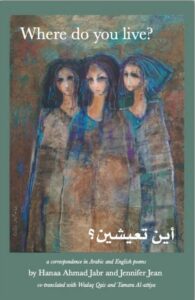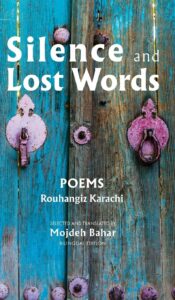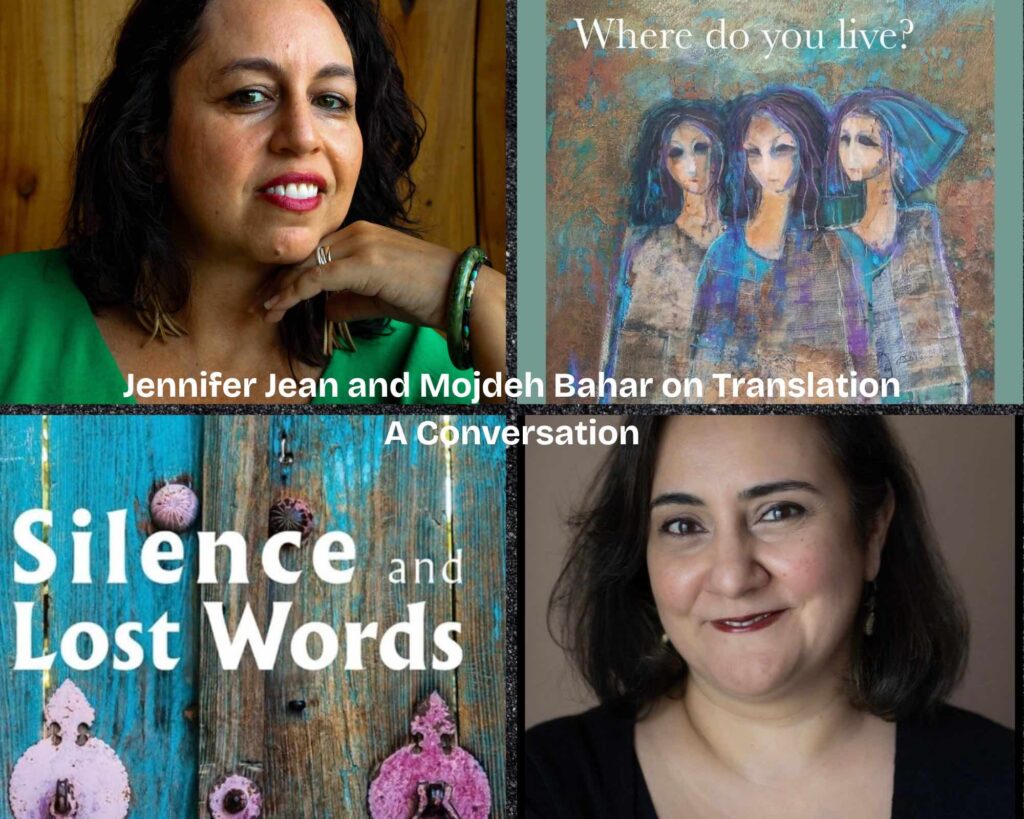Jennifer Jean on Where do you live? and Mojdeh Bahar on Silence and Lost Words: A Conversation on Translation
MER is pleased to present an interview with two authors on their recent books of poetry in translation:
Jennifer Jean on Where do you live? and Mojdeh Bahar on Silence and Lost Words. Jean and Bahar then interviewed each other, leading to an intriguing and revealing conversation. Enjoy!
 JENNIFER JEAN ON WHERE DO YOU LIVE?
JENNIFER JEAN ON WHERE DO YOU LIVE?
Where Do You Live? is a bilingual, collaborative collection of questions and responses in Arabic and English, written and co-translated by Iraqi poet Dr. Hanaa Ahmad Jabr and American poet Jennifer Jean-with the aid of Iraqi translators Tamara Al-Attiya and Wadaq Qais. In this intensely intimate book, poet talks to poet, and poem talks to poem. The process of the book’s creation is a profound gesture towards peace and healing by women who believe in the enduring power of open-hearted dialogue. The “where” in question isn’t limited to a physical space but to the places minds and souls linger or reside.
MER: What is the book about? What inspired this book?
JJ: Where do you live? is a correspondence in poetry between me and Hanaa Ahmad Jabr that reaches across spatial, linguistic, and cultural differences to connect based on our concerns and connections to war, poetry, womanhood, and friendship.
Hanaa and I are members of Her Story, a collective which seeks to build bridges of peace between Iraqi and American women artists through collaborative projects. This project has been sponsored, informed, and sparked by HSI.
MER: What were the challenges in writing and editing the book and what did you learn from the process? What were some of the strategies you used in forming the book–selecting the work, ordering, etc.?
JJ: The creation of this collaborative book was a time-consuming process dependent on trust, respect, commitment, and careful communication. Because I was the primary contact for our American based publisher, I tended to nudge things along—such as creating the first ordering of the drafted manuscript. However, we always discussed and came to a consensus regarding everything having to do with the book—including poem order, dedications, cover art, and more.
MER: How is translating similar or different from writing your own poetry? Do you collaborate with the original author or is the translation a separate work?
JJ: I do not collaborate when I write my own poetry. In fact, “art by committee” is abhorrent to me. But co-translation is not a committee endeavor. It is collaboration between people with clearly defined roles. For example, Hanaa would write and revise and complete her poem; then, Wadaq and Tamara would give me their raw translations of Hanaa’s work; and then, I’d shape and refine it into something a reader of English could not only understand but also appreciate as beautiful and compelling art while staying true to Hanaa’s meanings and intentions. Whenever I didn’t understand something, we’d have a conversation—still, my function was as an expert in poetry written in English and I was honored to be trusted with this role.
MER: How does this book fit into the scope of your other work? Is it a progression, a diversion, or something else entirely?
JJ: After I completed Object Lesson, my collection exploring sex-trafficking and objectification in America, I began to compose poems exploring forgiveness. Where do you live? interrupted the completion of that collection but it’s still in line with its themes in that Hanaa and I wrote with an awareness of America’s culpability in much of Iraq’s sufferings connected to war.
MER: What are you working on currently?
JJ: As I said, I’m working on a collection exploring forgiveness. As well, I’m working on an essay about translation for Poetry Magazine. And, I’ve edited Other Paths for Shahrazad: a Bilingual Anthology of Contemporary Poetry by Arab Women which will be released by Tupelo Press in January 2026 so I’m prepping for that. I’m also in talks to edit a series of co-translated poetry collections by Arab women. Finally, I’m (very slowly!) working on a wild memoir in essays. Lots going on! Which makes me happy.
*****

MOJDEH BAHAR ON “SILENCE AND LOST WORDS”
Silence and Lost Words: Poems is a selection from Iranian poet Rouhangiz Karachi’s acclaimed collections, but also includes eleven of her unpublished poems in English and Persian. Mojdeh Bahar’s marvelous translations make this collection as accessible to a casual fan of poetry as to a comparative literature scholar
MER: What is the book about? What inspired this book?
MB: Silence and Lost Words, is a bilingual selection of poetry by Rouhangiz Karachi, a contemporary poet, scholar and professor, translated to English. The book spans fifty years of poems. Karachi’s poetry depicts a complex woman who perceives keenly and feels deeply. She is a woman of contradictions, dreams and imagination.
I had translated some of Karachi’s work in my expanded anthology Song of the Ground Jay: Poems by Iranian Women 1960-2023. I had contacted her to get her permission to translate the poems and to make sure she agreed with my selection. She was kind and generous. My short text to her was the start of a great collaboration. She sent me a selection of her four published poetry collections and some of her critical works. The books arrived on a Friday and I spent the entire weekend reading them and translating the poems as I read them. I was in awe of her scholarship, fascinated with her poetic lexicon. I then wrote to thank her for the books and ask her permission to translate some of her poems.
MER: What were the challenges in writing and editing the book and what did you learn from the process? What were some of the strategies you used in forming the book–selecting the work, ordering, etc.?
MB: As my point of departure was already a selection of Karachi’s poetry, further narrowing the selection was not an easy task as I liked many of the poems. This was especially challenging because I was also in receipt of some of Karachi’s unpublished poems and had intended to include most of them as well. I arranged the poems chronologically as they had appeared in the original selection and preserved the chronology by ending with the unpublished poems. I thought it was important to see the trajectory of the poet, her lexicon, her neologisms and to appreciate their evolution over time. The book was formatted so that the English and Persian text are on opposing pages, with the lines matching.
MER: How is translating similar or different from writing your own poetry? Do you collaborate with the original author or is the translation a separate work?
MB: As a translator I feel an obligation to reflect the poet’s message as accurately as possible. This accuracy far surpasses word choice, tone, and linguistic register; it needs to capture the essence of the poem and the feelings evoked in the reader. After the first translation is done, I read, cross out, re-write until I feel that I have been as accurate as I can. To me this is both a huge gift and an immense responsibility.
While I do believe that the translation needs to stand on its own, I strive to have it deeply rooted in the original text. The collaboration with the poet enhances both the process of translation and the resulting text.
MER: How does this book fit into the scope of your other work? Is it a progression, a diversion, or something else entirely?
MB: I would say a progression. In 2023 my anthologies with first 52 women poets and later with 104 poets were published, and I have since worked on some of those poets individually in In the Mirror: Poems and Collages and Silence and Lost Words.
MER: What are you working on currently?
MB: A selection of poetry of yet another contemporary Persian poet.
*****
 INTERVIEW OF JENNIFER JEAN BY MOJEH BAHAR
INTERVIEW OF JENNIFER JEAN BY MOJEH BAHAR
MB: This book is a beautiful collaboration between two poets writing in two different languages from two different geographies who explore common themes in a deeply personal way while inviting the other on their respective journeys. Can you describe this experience?
JJ: This collaboration was an exercise in patience and trust. So much discussion and time went into the translation of each poem into the other’s language! And when the book was accepted for publication, we needed to speed up the process which wasn’t easy because we are both careful writers who are serious about thorough revision. In the end, this relative rush was fine. The essential aspect of creating a relationship—a friendship—across many boundaries remained and was entirely fulfilling.
MB: While the book’s subtitle is “a correspondence in Arabic and English poems,” it is at once a correspondence and a collaboration. Each of you has co-translated the poems of the other, each poem is thus a collaboration between the two of you. How did you straddle the space between translator and poet from one poem to the other?
JJ: Because we were writing in correspondence with each other it wasn’t too difficult. The co-translation process allowed me to fully enter into what she was sharing in each poem. And if I didn’t understand something, then she and I and either Wadaq or Tamara had conversations about her images, metaphors, references, word choices, etc. Understanding her poems in this way made me eager to process and respond to her work—as well as to our conversations and WhatsApp exchanges.
And yes, each poem is a collaboration. As such, I was aware that it was my responsibility to make sure the English versions of her poem were beautiful and compelling for English readers.
MB: In the 12 poems you wrote, you call Hanaa by name in 8, and in her poems she calls you by name in 5 of them. Why is it important that you call out to one another?
JJ: We didn’t plan to call out to each other in the poems. But because the nature of the project was a correspondence, a direct address often made sense. For instance, some calling out came from utilizing each other’s poems as prompts for our own poems. Also, naming the other is natural when you’re building a relationship. Naming adds relational depth. When we didn’t name each other, I believe we were aware that we were each other’s primary “you.” The secondary “you” would be the readership in the other’s language.
MB: Can you tell us about the two sets of poems with the same title: “Three Tales” and “Where Do you Live?”
JJ: Hanaa wrote her version of “Three Tales” first—which was the second or third poem she sent to me. When I worked on the co-translation with Tamara, I felt Hanaa was making herself vulnerable to me (the primary “you” before a general readership). I ended up utilizing that poem as a prompt for my own “Three Tales” and addressed Hanaa in way that made me vulnerable too—but directly to her.
MB: The book starts with your poem “Where do you live” and ends with Hanaa’s poem with the same title. While both poems are tender reflections on home, they also contemplate the role of language/poems/tales and their connection to the notion of home. Can you tell us about that?
JJ: Unlike the other poems in the collection, we’d planned from the beginning to each write a title poem. These were among the final poems we wrote so they’re built on the foundation of many conversations and experiences co-translating each other’s work. We’d talked so much about our relationship to poetry (which is very similar!) and about how poets are “fated” to be poets so it’s likely we both intuitively followed similar themes. Also, I think all practicing artists know they don’t only reside in a geographical location. We understand we reside in our language and memory and hope for change—and in many other conceptual locales.
Hanaa and I also planned the placement of these title poems before the collection was completed. We were aware we were composing a “project book” and the placement of these poems would create an intense journey for readers of English (reading the book left to right) and readers of Arabic (reading the book right to left).
*****

INTERVIEW OF MOJDEH BAHAR BY JENNIFER JEAN
JJ: You’ve edited the beautiful anthology Song of the Ground Jay: Poems by Iranian Women, 1960-2022 (Mage, 2023). How did your experience working with a variety of work by numerous poets differ from working solely with the poetry of Rouhangiz Karachi?
MB: Thanks for the kind words, Jennifer. In compiling the anthology, every poet marked the beginning of a new project for me. Once I chose the poets whose work I wanted to translate, I had 104 mini-projects. The process of translating each poet was invigorating, exciting, and short-lived.
In translating a single poet, I had the privilege of delving deeper in the poet’s work. In the case of Rouhangiz Karachi, I had the opportunity to read her critical and scholarly works prior to starting my translations. It was at a slower, more contemplative pace.
JJ: Did you consult a lot, a little, or not at all with Karachi? And how does this differ from your translation experiences when the poet is not available for discussion and query?
MB: I had the privilege of consulting with the poet as needed. Dr. Karachi was patient, kind and thorough in providing explanations. So far, for the majority of my translations, I have had access to the poets–mostly through email or social media. I believe that discussions and inquiries enrich the translation and make the process more enjoyable and meaningful.
JJ: In your preface you said that you “endeavored to select poems that have more universal themes.” Why? Does your choice have anything to do with the expected readership for this collection?
MB: My goal in translating the works of contemporary Iranian poets is largely born out of my desire to act as a bridge between non-Persian speakers and a beautiful literary treasure. I wanted to introduce the poetic work of Rouhangiz Karachi to English speakers. I wanted to emphasize the universality of her themes which in her case was not at all difficult.
JJ: Why are the poems in each grouping dated but out of order? In other words, by what process or reasoning did you order the poems in each grouping?
MB: I followed the order in the original selection which itself chronologically arranges the four prior collections.. The selection does not however keep the poems in chronological order, only the selections. I kept the groupings and the order together.
JJ: What is an untranslatable aspect, or line, or word from Karachi’s poetry that you wish her readership in English could most understand?
MBL She has some beautiful neologisms such as patience-land, sorrow-land, which I believe preserve the unique qualities of her poems. She also uses certain landscapes for their connotations, necessitating the addition of an adjective in the English version to convey the sentiment.
Jennifer Jean’s poetry collections include VOZ, Object Lesson, and The Fool. Her resource book is Object Lesson: a Guide to Writing Poetry. Along with Iraqi poet Hanaa Ahmad Jabr, she’s co-written and co-translated a correspondence in Arabic and English poems, titled Where do you live? أين تعيشين؟. (Arrowsmith, 2025). As well, she’s the editor of Other Paths for Shahrazad: a Bilingual Anthology of Contemporary Poetry by Arab Women (Tupelo, 2026). Her work appears in POETRY, Rattle, On the Seawall, The Common, and the Los Angeles Review; as well as on The Slowdown Podcast and in the Academy of American Poets “Poem-a-Day” series. She’s received honors from the Kenyon Review Writers Workshop, the Mass Cultural Council, and the Women’s Federation for World Peace. Jennifer is an organizer for the Her Story Is collective, a faculty member at the Solstice MFA, and a senior program manager at the Fine Arts Work Center.
Dr. Hanaa Ahmad Jabr was born in Mosul, Iraq. She is a prize-winning poet and short story writer who has participated in critical conferences and international poetry festivals. She has a PhD of Philosophy in Arabic Literature. Her books include the poetry collections I Draw My Sorrow from His Collar, and two books of criticism: The Dialectic of Poetry and Prose in Modernist Poetry, and The Poetics of the Prose Poem. Additionally, she’s released a children’s book: Sultan and Shanidar. Hanaa teaches at the University of Mosul.
Where do you live? by Dr. Hanaa Ahmad and Jennifer Jean
Arrowsmith Press, May 10 2025
Paper, 108 pages
979-8990405073
Mojdeh Bahar received her J.D. from University of Maryland Carey School of Law; her M.A. in French from NYU, and her B.S. in Chemistry and French from Dickinson College. Mojdeh has a deep interest in languages and world literature including Persian Poetry. She has translated a selection of Shafi’i Kadkani’s nature poetry entitled Milkvetch and Violets, (Mage, 2021 & 2024) selected and translated poems by 52 Iranian women poets entitled Song of the Ground Jay: Poems by Iranian Women, 1960-2022, (Mage, 2023) and translated poems of Taraneh Habib, In the Mirror: Poems and Collages; and selected and translated the poetry of 104 contemporary Iranian women poets entitled, Song of the Ground Jay, Expanded Edition (Gordyeh Publishers, 2023 for both books). Her translations have also appeared in Lyrikline, Stepaway, Loch Raven Review, and Women, Life, Freedom, an anthology by Guernica Editions.
Rouhangiz Karachi was born in Firuzabad, an ancient Iranian city located between Shiraz and the Persian Gulf. Poetry has always played an important role in her life; she was allowed to enter primary school at age six because she could recite poetry. Her four poetry collections in Persian depict women’s social struggles and internal tensions. For over forty years, Karachi’s scholarly work has also focused on Iranian women, poets and protagonists alike. With the insightful perspective of a poet, and the skill of a scholar, Rouhangiz Karachi’s “woman” appears universal. Her poems give a strong sense of introspection, keeping an unkind world at bay-a magnificent, exquisitely disciplined literary gift has been brought to bear upon the unbearable.
Silence and Lost Words: Poems by Rouhangiz Karachi (Author), Mojdeh Bahar (Translator)
Mage Publishers, March 4, 2025
Hardcover, 202 pages
978-1949445855

